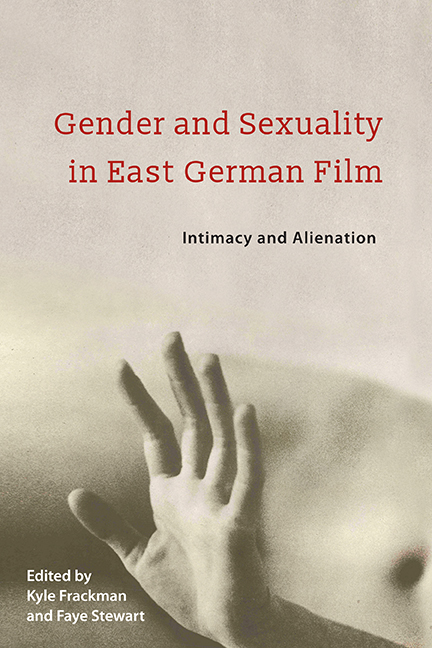Book contents
- Frontmatter
- Contents
- Acknowledgments
- List of Abbreviations
- Introduction: Sex and Socialism in East German Cinema
- 1 Hypnagogic Mothers: Gender, Amateur Film Labor, and the Transmissive Materiality of the Maternal Body
- 2 Powerless Heroines: Gender and Agency in DEFA Films of the 1960s and 1970s
- 3 Jutta Hoffmann and the Dialectics of Happiness: A Socialist Star in Close-Up
- 4 Who Is the “Third”? Homosociality and Queer Desire in Der Dritte
- 5 Volatile Intimacies and Queer Polyamory in GDR Film
- 6 Interracial Romance, Taboo, and Desire in the Eastern Counter-Western Blutsbrüder
- 7 The Desire to Be Desired? Solo Sunny as Socialist Woman's Film
- 8 Ambivalent Sexism: Gender, Space, Nation, and Renunciation in Unser kurzes Leben
- 9 Dealing with Cancer, Dealing with Love: Gender, Relationships, and the GDR Medical System in Lothar Warneke's Die Beunruhigung
- 10 Reimagining Woman: The Early Shorts of Helke Misselwitz
- 11 Shame and Love: East German Homosexuality Goes to the Movies
- 12 Gendered Spectacle: The Liberated Gaze in the DEFA Film Der Strass
- Notes on the Contributors
- Index
2 - Powerless Heroines: Gender and Agency in DEFA Films of the 1960s and 1970s
Published online by Cambridge University Press: 16 May 2018
- Frontmatter
- Contents
- Acknowledgments
- List of Abbreviations
- Introduction: Sex and Socialism in East German Cinema
- 1 Hypnagogic Mothers: Gender, Amateur Film Labor, and the Transmissive Materiality of the Maternal Body
- 2 Powerless Heroines: Gender and Agency in DEFA Films of the 1960s and 1970s
- 3 Jutta Hoffmann and the Dialectics of Happiness: A Socialist Star in Close-Up
- 4 Who Is the “Third”? Homosociality and Queer Desire in Der Dritte
- 5 Volatile Intimacies and Queer Polyamory in GDR Film
- 6 Interracial Romance, Taboo, and Desire in the Eastern Counter-Western Blutsbrüder
- 7 The Desire to Be Desired? Solo Sunny as Socialist Woman's Film
- 8 Ambivalent Sexism: Gender, Space, Nation, and Renunciation in Unser kurzes Leben
- 9 Dealing with Cancer, Dealing with Love: Gender, Relationships, and the GDR Medical System in Lothar Warneke's Die Beunruhigung
- 10 Reimagining Woman: The Early Shorts of Helke Misselwitz
- 11 Shame and Love: East German Homosexuality Goes to the Movies
- 12 Gendered Spectacle: The Liberated Gaze in the DEFA Film Der Strass
- Notes on the Contributors
- Index
Summary
AT FIRST GLANCE, the periods of culture discussed in this chapter seem similar. The early 1960s and the early 1970s are considered the most liberal periods of East German cultural history. They are also seen as comparable from a perspective of power politics: both have been interpreted as political concessions to the field of culture after major political ruptures. A second glance, however, reveals significant differences, especially as regards gender. Indeed, men dominate the movies depicting contemporary life in the GDR of the 1960s and women those of the 1970s. This corresponds to the overall representation of East German society in cinema, and more specifically, to the ability to transform it. Despite the evident abandonment of political master narratives and the “Ruckzug in den Alltag” (retreat into everyday life) that has been described as a leitmotif of literature and film in the 1970s, GDR cinema became neither apolitical nor acritical.
DEFA cinema of the 1960s—and East German narrative culture in general—followed a representational model, with characters designed to serve as allegories for tangible social problems. The narrative and visual organization of 1970s DEFA films predominantly follows another paradigm I call the mode of adumbration, and the gain in female agency in the cinema of the 1970s is indeed symptomatic of the latter. While most DEFA films in the 1960s show the GDR as a society in transition, the culture of the 1970s reflects a country that resigned from its ideological promise, a “developed socialist society” without a vision for its own future.
It is not by accident that this paradigmatic shift in the representation of society coincides with a change in perspective from presumably male approaches to others coded as female. More than 50 percent of contemporary screen dramas in the last two decades of East German cinema feature female leads, which is astonishing, given that the DEFA studios were male dominated. At the core of the evolving preference toward female protagonists lies a rather traditional gender bias delegating the reflection of power and struggle to male protagonists, while more psychological narrative functions were assigned mostly to female leads.
- Type
- Chapter
- Information
- Gender and Sexuality in East German FilmIntimacy and Alienation, pp. 42 - 61Publisher: Boydell & BrewerPrint publication year: 2018

